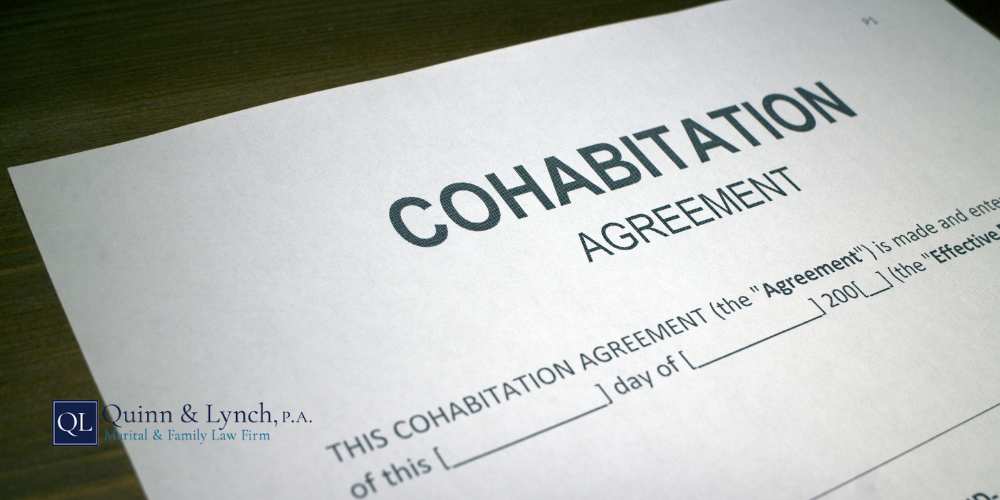Common law marriage in Florida is a concept that many might assume exists, given its presence in various other states and jurisdictions. However, it’s essential to understand that the state of Florida does not recognize common-law marriages. This means that couples who cohabit and present themselves as married without undergoing the formal legal marriage process will not be granted the same legal status and rights as those who have been legally married under state law. This distinction of a lack of common-law marriage in Florida is crucial for residents to understand, especially in matters related to inheritance, property rights, and other legal benefits typically afforded to married couples.
For those seeking clarity on how an existing common-law marriage from another state may be viewed in Florida, the knowledge of a seasoned attorney is invaluable.
The Tampa divorce and family law attorneys at Quinn & Lynch P.C. can help you understand your situation and guide you through the complexities of marriage laws in Florida. Call 813-223-7739 or contact us online to schedule your appointment.
What is Common Law Marriage?

A common law marriage is a legally recognized union without a marriage license or formal ceremony, where a couple is considered married due to their actions and relationship duration. This only applies to other states that consider common law marriage to be a valid legal marriage, not in Florida.
In states recognizing common law marriage, a couple generally must live together for a significant period, present themselves as a married couple, and intend to be married.
While Florida does not recognize common law marriage, the law will recognize such unions formed in other states where the law permits.
In these recognized cases, individuals in a long-term relationship who have cohabitated and publicly acted as if they were a married couple might have the same legal rights and obligations as those married with a license.
What States Recognize Common Law Marriages?
The states of Colorado, Iowa, Kansas, Montana, and Texas are among the few that recognize common law marriages, allowing couples to be considered legally married without a formal ceremony or marriage license.
In these states, individuals who meet specific criteria, such as cohabitation and presenting as a married couple, can be considered married under common law.
This means that in Colorado, Iowa, Kansas, Montana, and Texas, couples can attain the legal status of marriage through common law by fulfilling certain conditions set by each state’s laws, thereby being recognized as legally married without going through the traditional marriage process.
Does Florida Recognize Common Law Marriage?

Florida does not recognize common law marriages formed within the state. Florida law will not acknowledge these unions as common law marriages for relationships where two parties consider themselves married without formal legal proceedings or a marriage license.
However, it’s important to note that Florida does recognize common-law marriages established in other states where such unions are legally recognized. This distinction is crucial for couples moving to Florida from a state that recognizes common-law marriage.
Common Law Marriage Alternatives in Florida
In Florida, many couples looking for alternatives to traditional marriage or common law marriage have several options according to state law. While common law marriage is not recognized for relationships established within the state, Florida law does offer legal frameworks for couples to formalize their relationship and enjoy rights similar to those of legally married couples.
These alternatives allow couples in Florida to establish a legally recognized relationship, even though the state does not recognize new common-law marriages.
Domestic Partnership
A domestic partnership in Florida offers unmarried couples a legal recognition of their relationship, granting them certain rights traditionally reserved for married couples.
This arrangement is beneficial as it allows partners to make healthcare decisions for each other, visit each other in the hospital, and enjoy other legal rights that strengthen their bond as a committed couple.
By registering for a domestic partnership, partners can ensure that their relationship is acknowledged by the state, providing a layer of legal security and recognition without the need for marriage.
Cohabitation Agreement
In Florida, a cohabitation agreement offers a way for unmarried couples to formalize aspects of their relationship, such as sharing assets and making health care decisions.
The Florida cohabitation landscape changed significantly in 2016 when Governor Rick Scott repealed the longstanding Florida statutes. Since 1868, it was technically illegal for an unmarried couple in Florida to live together. This prohibition remained in place despite its rare enforcement.
A cohabitation agreement is a legal document that an unmarried couple can file to establish clear guidelines about how they will share assets, make health care decisions, and manage other aspects of their shared lives.
Legal Protections for Unmarried Couples Living Together in Florida

In Florida, unmarried partners seeking legal protection face certain challenges, as the state does not recognize common-law marriage. This means that, without formal marriage, individuals in a relationship do not automatically receive the rights and protections of a traditional spouse.
Despite this, there are legal mechanisms through which many couples who live together can secure some level of protection. Even though a Florida common law marriage will be legally unrecognized, unmarried partners can still take steps to safeguard their rights and ensure they are treated fairly in matters typically reserved for married couples.
Financial Protection and Property Rights
Many couples in Florida are concerned with financial protection and property rights, especially regarding the ability to inherit property or ensure their assets are distributed according to their wishes.
For property agreements and wills to be considered valid, both parties must document their intentions and follow legal protocols to protect their property rights. This is particularly important in Florida, where the law does not automatically recognize the property rights of unmarried couples.
A property division lawyer in Tampa can help to guide you through this process.
Medical Decisions
When it comes to making medical decisions for a partner in the event of incapacity or death, the legal rights of an unmarried couple can be significantly limited without proper documentation.
For health insurance purposes and the authority to make medical decisions, Florida law requires substantial compliance with specific legal protocols to ensure that an individual’s wishes are honored. Without a valid legal framework, the partner in an unmarried couple may be unable to make critical medical decisions for the other.
Minor Children
When it comes to minor children, Florida custody laws for unmarried parents can become complex, especially for an unmarried partner who may not automatically be recognized as having the same rights as a married person or the other biological parent.
Substantial compliance with Florida’s legal framework is essential for an unmarried partner seeking to establish legal rights over a minor child. It is crucial for anyone looking to navigate these waters to understand that without formal legal acknowledgment, an unmarried partner’s ability to make decisions or take certain actions on behalf of a child may be limited.
Securing legal advice from a Florida child custody attorney is imperative for safeguarding their rights and ensuring the child’s well-being.
Recognition of Common Law Marriages From a Different State
While Florida does not establish new common-law marriages, the law will recognize a common-law marriage that was validly formed in another state. Such marriage recognition is crucial for ensuring these couples can access various legal benefits, from property division to spousal support.
Divorce from Common Law Marriage in Tampa, Florida
In Tampa, Florida, individuals seeking a divorce from a common law marriage entered into in another state must navigate the state’s legal system with care.
Although Florida’s state law does not allow the formation of new common-law marriages, it does recognize those legally established elsewhere. This means that each spouse is subject to the same divorce proceedings as traditionally married couples when they decide to part ways.
Navigating this process requires a thorough understanding of Florida’s divorce laws. An experienced divorce attorney in Tampa will provide guidance and representation in court, ensuring that the rights and interests of both parties are adequately protected throughout the dissolution process.
Proving a Valid Common Law Marriage
Proving a valid common-law marriage requires demonstrating the relationship existed in good faith under the principles recognized in the state where the common-law marriage was established.
For a couple to be considered married without a marriage license, they must show that they have presented themselves to the public as a married couple, intending to be seen and act as spouses. It’s important to contact a family law attorney who will provide invaluable guidance to ensure the couple’s union is recognized, protecting their rights as a married couple.
How a Tampa Divorce Lawyer Can Help
Whether you’re traditionally married or involved in a previous common law marriage, a Tampa divorce attorney from a reputable firm like Quinn and Lynch can provide invaluable assistance to a person navigating the complexities of divorce. With deep knowledge of Florida’s family law, we can guide you through the dissolution process, help protect your rights, and ensure fair division of assets and responsibilities.
Contact a Tampa family law attorney today to see how we can help you through this challenging time with confidence and clarity.
















